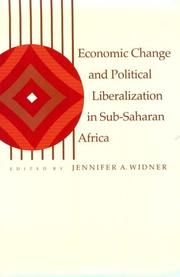| Listing 1 - 10 of 11 | << page >> |
Sort by
|

ISBN: 0801847583 Year: 1994 Publisher: Baltimore, Md Johns Hopkins University Press
Abstract | Keywords | Export | Availability | Bookmark
 Loading...
Loading...Choose an application
- Reference Manager
- EndNote
- RefWorks (Direct export to RefWorks)
Economic policy and planning (general) --- Political systems --- Sub-Saharan Africa

ISBN: 080184844X 9780801848445 Year: 1994 Publisher: Baltimore (Md.): Johns Hopkins University press,
Abstract | Keywords | Export | Availability | Bookmark
 Loading...
Loading...Choose an application
- Reference Manager
- EndNote
- RefWorks (Direct export to RefWorks)
Structural adjustment (Economic policy) --- Africa, Sub-Saharan --- Politics and government --- Africa [Sub-Saharan ] --- 1960 --- -Africa, Sub-Saharan - Politics and government - 1960 --- -Africa [Sub-Saharan ] --- -Structural adjustment (Economic policy) --- -Structural adjustment (Economic policy) - Africa, Sub-Saharan --- Africa, Sub-Saharan - Politics and government - 1960

ISBN: 0520076249 0520911857 0585274797 9780520911857 9780585274799 9780520076242 Year: 1992 Publisher: Berkeley, California : University of California Press,
Abstract | Keywords | Export | Availability | Bookmark
 Loading...
Loading...Choose an application
- Reference Manager
- EndNote
- RefWorks (Direct export to RefWorks)
Although Kenya is often considered an African success story, its political climate became increasingly repressive under its second president, Daniel arap Moi. Widner charts the transformation of the Kenya African National Union (KANU) from a weak, loosely organized political party under Jomo Kenyatta into an arm of the president's office, with "watchdog" youth wings and strong surveillance and control functions, under Moi. She suggests that single-party systems have an inherent tendency to become "party-states," or single-party regimes in which the head of state uses the party as a means of control. The speed and extent of these changes depend on the countervailing power of independent interest groups, such as business associations, farmers, or professionals. Widner's study offers important insights into the dynamics of party systems in Africa.
Regions & Countries - Africa --- History & Archaeology --- Kenya African National Union. --- Kenya --- Politics and government --- KANU --- K.A.N.U. --- Kīnyā --- Kenia --- Kenii︠a︡ --- Chenia --- Cenia --- Government of Kenya --- Republic of Kenya --- GOK --- Jamhuri ya Kenya --- Kenya Colony and Protectorate --- Colony and Protectorate of Kenya --- ケニア --- קניה --- Ḳenyah --- Quênia --- كينيا --- Kīniyā --- 肯尼亚 --- Kenniya --- Кения --- East Africa Protectorate --- HISTORY / Africa / General. --- 20th century african history. --- 20th century kenyan history. --- autocrat. --- corruption. --- daniel arap moi. --- dictator. --- governmental control. --- head of state. --- human rights abuses. --- human rights. --- jomo kenyatta. --- kadu. --- kanu. --- kenya african national union. --- kenya. --- kenyan african democratic union. --- kenyan history. --- kenyan politics. --- party states. --- political climate. --- president of kenya. --- regimes. --- repressive government. --- single party system. --- surveillance. --- watchdog.
Book
ISBN: 110868825X 1108427278 110861258X 1108671756 9781108612586 9781108671750 9781108688253 9781108427272 9781108447980 Year: 2022 Publisher: Cambridge : Cambridge University Press,
Abstract | Keywords | Export | Availability | Bookmark
 Loading...
Loading...Choose an application
- Reference Manager
- EndNote
- RefWorks (Direct export to RefWorks)
This book seeks to narrow two gaps: first, between the widespread use of case studies and their frequently 'loose' methodological moorings; and second, between the scholarly community advancing methodological frontiers in case study research and the users of case studies in development policy and practice. It draws on the contributors' collective experience at this nexus, but the underlying issues are more broadly relevant to case study researchers and practitioners in all fields. How does one prepare a rigorous case study? When can causal inferences reasonably be drawn from a single case? When and how can policy-makers reasonably presume that a demonstrably successful intervention in one context might generate similarly impressive outcomes elsewhere, or if massively 'scaled up'? No matter their different starting points - disciplinary base, epistemological orientation, sectoral specialization, or practical concerns - readers will find issues of significance for their own field, and others across the social sciences. This title is also available Open Access.
Social sciences --- Methodology. --- Civilization --- Behavioral sciences --- Human sciences --- Sciences, Social --- Social science --- Social studies
Book
ISBN: 9781108688253 9781108427272 9781108447980 Year: 2022 Publisher: Cambridge Cambridge University Press
Abstract | Keywords | Export | Availability | Bookmark
 Loading...
Loading...Choose an application
- Reference Manager
- EndNote
- RefWorks (Direct export to RefWorks)
Book

ISBN: 9781685856151 Year: 2022 Publisher: Boulder
Abstract | Keywords | Export | Availability | Bookmark
 Loading...
Loading...Choose an application
- Reference Manager
- EndNote
- RefWorks (Direct export to RefWorks)
Digital

ISBN: 9781685856151 Year: 2022 Publisher: Boulder Lynne Rienner Publishers
Abstract | Keywords | Export | Availability | Bookmark
 Loading...
Loading...Choose an application
- Reference Manager
- EndNote
- RefWorks (Direct export to RefWorks)
Book

ISBN: 9781685859350 Year: 2022 Publisher: Boulder
Abstract | Keywords | Export | Availability | Bookmark
 Loading...
Loading...Choose an application
- Reference Manager
- EndNote
- RefWorks (Direct export to RefWorks)
Multi

ISBN: 9781685859350 Year: 2022 Publisher: Boulder Lynne Rienner Publishers
Abstract | Keywords | Export | Availability | Bookmark
 Loading...
Loading...Choose an application
- Reference Manager
- EndNote
- RefWorks (Direct export to RefWorks)
Book

ISBN: 9781400835799 Year: 2010 Publisher: Princeton, NJ
Abstract | Keywords | Export | Availability | Bookmark
 Loading...
Loading...Choose an application
- Reference Manager
- EndNote
- RefWorks (Direct export to RefWorks)
| Listing 1 - 10 of 11 | << page >> |
Sort by
|

 Search
Search Feedback
Feedback About UniCat
About UniCat  Help
Help News
News